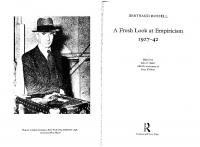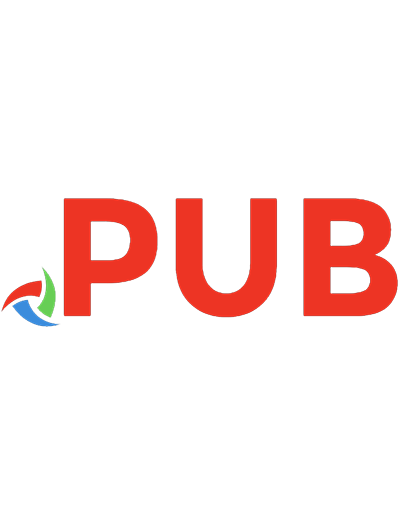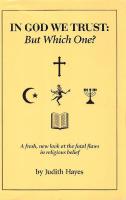In God we trust : but which one? : a fresh, new look at the fatal flaws in religious belief
209 14 26MB
English Pages [232] Year 1996
Polecaj historie
Citation preview
IN GOD WE TRUST: But Which One?
t e~ A fresh, new look at the fatal flaws
in religious belief
by Judith Hayes
IN GOD WE TRUST: But Which One?
A fresh, new look at the fatal flaws in religious belief
by Judith Hayes
FFRF, Inc.
PO Box 750 Madison WI 53701
Published by Freedom From Religion Foundation, Inc.
PO Box 750 M adison WI 53701-0750 (608) 256-8900 Fim printing, September 1996
© Copyright 1996 by Judith Hayes. Alf rights reserved.
ISBN: 1-877733-1 1-3
Printed in rhe United $rares of America
To Susan, a loving friend, who unknowingly changed my lifeforevcr
Contents Foreword 7 Imroducrion 9
Chapter I -
Where Angels Fear To Tread 11
Chapter 2 -
The One True God I 7
In The Beginning 24 Lee Us Pray 28 The One-Sided Triangle 32 The Old Rugged Cross 34 Those Good Old Family Values 38 Bur He That Believcch Noc .... 44
Chapter 3 -
The Good Book 53
Thou Shalt Nor Kill 55 (Judich's Lisr of Biblical Murders 56) A Killing Update 63 T he Ten Or So Commandmencs 64 As Foretold By The Prophets 68 Jabberwod..)' 73
Chapter 4 -
The Genesis OfAbsurdity 77
Twinkle, Tv1ink1e, Little Star 77 T he Eve Thing 82 Murder, God Wrote 86 When It Rains, Ir Pours 90 Open Your Books To Chapter One 92
Chapter 5 - Sex And Satan 95 Here Comes The Bride 97 The Gay Nineties I 07 Be Fru itful And Multiply 110
Chapter 6 -
The Messiah
119
For Unro Us A Child ls Born 120 Miracle On Ma in Street 127 Separate Checks, Please 131 He Is Risen? 135 Jesus And Jehovah 142 The "Christ-Killers" ? 146
Chapter 7 - Pandora's Box l 53 Save Yourselves! 155 T he Devil You Say I 58 Now 1 Lay Me Down To Sleep 162 The Question Of Evil 166
Chapter 8 -
Doing Good 171
Behaving Yourself 177 Same To You, Fella! 188
Chapter 9 -
Is A nybody Out There? 191
Chapter 10 - A Most Unlikely Freethinker I 95 Bibliography 21 1 C hapter Notes 214 Index 217
Foreword
I
wish I had had chis book when I was muggling co hold on
ro my faith. I wouldn't have muggled so hard. During those last few years I was preaching, I pur on a face of confidence, as all ministers must do; but my clerical visage masked an underlying uneasiness and hypocrisy. I told everyone chat I was speaking the truth, but did I know it? Noc once, during my years of preach ing, did anyone ever ask for my sources or evidences. No one suggested char che "good book" might be unreliable or dangerous, or char the arguments for the existence of God could be faulty. As long as l went unchallenged, my fo undation for crurh remained unexa mined. The subtitle of chis book is "A fresh new look at the fatal flaws in religious belief." Thomas Paine's The Age ofReason has been enlightening us for more than rwo centuries with its incisive criticisms of che bible. Roberc Ingersoll, El izabeth Cady Stanton, and many ocher nineteenth-century freeth inkers spoke clearly and force fu lly about che faca l flaws of Christianity. Bertrand Russell's Why 1 Am Not A Christian and hundreds of cwentiech-century voices have contin ued the healthy hisrory of skepticism. Bue we are always in need of a fresh look - of something char speaks clearly and directly to today's believers. What the world needs, before it becomes persuaded of che fata l flaws of belief, is nor more criticism of religion - there is already enough there to convince even the least ambitious sm-
dent rhat religions are houses built on sand. What the world needs is ro "see" what's there. When l first began sensing chat Chrisrianiry might nor be as sound as it sounds, I wish someone had taken me gently by the chin and turned my face, saying, "Look. Look over here." This is exactly what Judith Hayes does. The scriptures have always had contradictions, bur she helps us co see chem. The unvarnished depictions of Jehovah and Jesus have nor been hidden all these centuries - we just have to look ar chem. If you are a freethinker, Judith's writings will give you a fresh perspective on how co apply religious criticism to rhe mind of a believer. This is rhe perfect book to give to your religious friends or relatives. Judith is a former insider who knows how to rake believers gently by the chin. If you are a believer, you will sense in these pages a ring of truth. This is nor a wild cannon shot from a disrant arheisr pirate ship. This is an inspection of rhe inside of your own ship, an examination of rhe irreparable fissures in the hull of Chriscianiry char are causing ir to sink fast. Perhaps you will learn chat che only way co be saved is co jump ship. Judith Hayes has been writing for Freethought Today since 1994. Her clear, enjoyable columns (a few culled from rhis book) have received high praise from freethinkers around rhe continent. IN Con \.\:IF T1ws1:· But Which One? is a needed and welcome addition ro the cause of freerhoughr. Dan Barlur
Fradom From Religion Foundation, Inc. 8
Introduction
L ey say that God is everywhere. This has neveo· been more true than today, in the I 990s. God is on our currency. He is invired to Congressional prayer breakfasts, public school graduation ceremonies and sporting events. These are trying times for chose of us dedicated to the separation of church and state. Many srares already have passed public school prayer laws and more are proposing them. Congress is considering a school prayer amendment and "creation science" is inching its way into public school science classes. James Madison would have been appalled. There arc those in rhe freeth ought community who frown on religious criticism, claiming it is a rocally negarivc activity. That it is; bur if C hristia ns are going ro try co push their Bible into our public classrooms, then it's rime to rake a good look at that Bible. The rimes demand ir. There have been hundreds of goddesses and gods worshipped throughout history. In the hiscory of rhe United Stares, however, che Judea-Ch ristian tradition is by far rhe most fami liar. This
9
I N GOD
WE TRUST: But Which One?
book will focus on that cradirion, with pa rricular emphasis on C hristian fundamentalism. As you wi ll see, rhe laws of logic unmask C hrisrianiry, exposing it as the empty theology rhat it JS.
Bur those same laws of logic also apply ro all other rel igions. Even though rhese other religions will nor be examined hcre, they, coo, cannot survive rhe rigors of intense scrutiny. When viewed thro ugh reason and not superstition , all religions fall by the wayside. They all emerge as dust in the wind, as the stuff that dreams are made of. As Walt Disney reminded us, "A d rea m is a wish your hearr makes." A prayer is noth ing more, no matter which god you believe you are addressing.
The Christian focus of rhis book wou ld be considered alien to
the poin t of being blasphemous in , for example, any Mus-
lim counrry. And this underscores tn)' whole poinr. If we want to d iscuss God, fine; but fi rst wc muse stare which god we're going co talk about. Far too many freerhoughr books are, in Mark Twain's phrase, chloroform in print. Scholarl y crearises have their places, bur very few of us can wade th rough them. So I'll leave the arcane analysis of mcraphysics, epistemology, and eschatology (along with any attendant oncological argume nts) to ochers. This book is written in plain old English, and is intended fo r the average lay reader. If it causes anyone ro pause and think really think - about religion's role in socicry, it will have been worth che effort. I ch ink we all need to be reminded of rhc beautifully crafted secular Cons rirnrion rhac has been rhe bedrock of our successfu l democracy. May we never forget it. 10
1 Where Angels Fear To Tread
There is much in the Bihlt· again.rt which evny instinct ofmy being rebels, so much th111 I regret the 11ecessity which hm compt'!!1?d me to read it through from bt'ginning to end. I do not think thrtt the knowledge which I h1111e gained ofits history and sources compemrues me far the 11nplertsant dm1ils it has farced up1m my flttention.
Helen Keller, "/'he Story Uj';llfy Life
E
r rhe first twenry years of my li fe, the mosr important part
ofmy life was my fa ith. Religion guided my every move. I was especially grateful, therefore,
to
have been born into a German
Lutheran family, since everyone knew that Lutheranism was the One True Religion. (And we were M issouri Synod, which is as Lutheran as you can gee.) I really felc that I had dodged a bullet here. What ifl had been born (shudder) a Catholic; o r, God forb id , an atheist?! Talk about luck. So when I was around rwelve and I fo rmed a close friend11
I N GoD W E TRUST:
But Which One?
ship with a Japanese girl, I discovered w my horror char she was Buddhist. Can you im agine? Buddhist! This threw me into a tailspin. Fo r one thi ng, T couldn't figure our how she co uld be so nice, being a Pagan and all. I was the original Goody Two Shoes, bur Susan was actually nicer than I was. (She stil l is.) How could chis be? Bue more important, I couldn't figure our how she was ever go ing to get into Heaven, where I, of course, was destined. Since I co uld nor hear the thought of my best friend, Susan, spending eterni ty in Hell, I ;1sked my rel igious leaders about this, and received a very complicated answer. [ was cold char she wouldn't necessarily go co Hell unless she had accually had the opponunicy to accept Jesus C hrist into her heart, and just havi ng a Christian church next door to her home did n't necessarily mean that she ever really had the opportunity, and on and on. Bur it didn't sacisf)1 me. And it didn't seem fa ir char just because I had been born inm a certai n Family I was guaranteed a blissful ecernirv, , whereas .Susa n's fore was far more d ubious. Thus was planted the seed of doubt, and as time went on my questions about Susan were created fi rst with stern impatience and finally with the ab rupt co mmand co fo rger about ir. God wo uld wo rk it all our, and He didn't need any help fro m me. So I kepr my doubts to myself lt still didn't seem fair, but I shut up about ic. However, from rhar point on, I worried abour it a great deal. Poor Susan. My decision ro read rhe enrire Bible, and thereby shore up my faith and answer all of my nagging questions, was made with grear rrepidation. Bur my background for such an ambirio us underraking was certainly approp riate. My grandfather and my 12
Where Angels Fear To Tread great-grandfather had both been Lutheran ministers. My father was the church organist and also raught Bible study classes. My mother was in the church choir (so was I) and my father read the Bible aloud every night after dinner. For one summer I actually taught vacation Bible school co the linle kids. I was a voracious reader, and a better than average scudenr. So even though I knew it would be arduous, I was certain that with enough rime and effort I would emerge from my stud ies with a bright, untarnished faich. I could n't have been more wrong. I began my journey of discovery with the absolure determination of strengthening my faith. Just the opposite happened. I wanred ro bolster my beliefs and co be able co back rhem up with quotations - chapter and verse if you will - bur the further my studies took me, rhe less cercain I became of rwy of my beliefs. I plunged even more fervently into my srudies, which led to yet more doubts. I finall y stopped going in circles and arrived at some inescapable conclusions. My own logica l mind, which I felt certain would help me wade through the myriad of conA icring faces and see me safely ro the orher side of that sea of doubt, instead proved ro be my undoing. I literally reasoned my fa ith our of existence. Such a metamorphosis is not ro be taken lightly and docs not happen easily when your faith is very strong ro begin with. I fought tooth and na il every seep of the way. I wanted my faith, and felt I needed my faith, and wacchi ng it leave was a very wrenching experience. In a Bible study class, along with aski ng about my poor, damned friend Susan (after a while everyone in that class was rired of hearing about Susan), I also began asking very poimed questions abour prayer and evil and rhe Pope.
13
IN
Gov WF TRUST: But Which One?
The dusry responses I received were, I now realize, the resulr of simply nor knowing how ro answer such insightful questions. My quesrions were not of the smarr-aleck variety, like so many of these kinds of questions are. No, my question s were prompted solely by rhe inrc.:nse desire to understand. I needed t0 know. Alas, my religious leaders were not up to providing adequate answers to my heartfelt quesrions. So I set out on my own quest. I undcrsrand now why the Catholic Ch urch fought so hard to keep irs Bible.: in Latin. If no one knows what it says, no one can question what ic says. And almost mqthing sounds prerry in Latin. Bue a nirry-grirry English translation puts the Bible in a whole new, unflattering light. I' ll bee there are many clergy who wish, very secretly of course, rhar they could have had a go ar editing the Bible before rhe priming press had been invenred. I'm sure they would like nor co be faced with the anachronisms, the concradicrions in the gospels, and che bloody violence chat saturates rhe Old Testamenr. Yes, indeed, Larin is a prerry language. None of these thoughts, however, was in my mind as I sec our bravely ro conquer chis nemesis called Doubt. l remember my sad, little begin ning as I plunged in to Genesis, determined to learn the mysreries of life, rhe meaning of faith, and rhe reason why I was so miserable. I believed in God wirh all my heart, and wirh all my soul, and with all my mind. l was a very good gi rl. In my youth I had never once had co stay after school, and I can srill remember clearly one of my few childhood lapses in behavior. After being told while shopping char, no, I could noc cat one of those luscious-looking scrawberries in the produce 14
Where Angels Fear To Tread section, since ic would be stealing, I wem ahead and did it anyway when my mother wasn't looking. I was thereafter stricken with guilr and I prayed endlessly for forgiveness. l had been, al most literally, an angel of a child. So how could I possibly have wound up married to a tyrant? Why had God forsaken me? Everything in my religious training led me to bel ieve chat such a thing could not happen to those who pur their cruse in God. So 1 earnestly began the inrrospecrive process of examining my own trust. Afrer mr eye-opening read ing of the Bib le I naturally went on to read ocher books about religion, and th ese other books finished the process char rhe Bible had starred. T hese other books, wrirren by nonbelievers, simply rang out with logic and cla ri ty. My faith tottered and then collapsed as I fou nd myself unable to resist the urgings of my own logical mind. The bacde was over. For a long rime I missed my fa ith, since it seemed to simplify things, bur overall its influence on my life was far more negative than positive. The helpless, puc-your-rrusc-in-God attitude encouraged by religion is unhealthy and in imical to happim:ss, and undoubtedly was rhe major facror in my own early misery. Thc "crust in God" approach to life discourages critical chinking and skepticism, both of which you need in healthy doses to navigate th is minefield called life. Ar rhe same time 1 also believe char no o ne who had anyching to do with my religious trainin g meant me any harm at all. (I cannot extend char same compliment to television eva ngelists, and I find their snake-oil approach co salvation revolting.) Alrhough I was con fused fo r quire a while after my faith left,
15
IN
G'oD WE TRUST: But Which One?
I finally realized char there is a big, beautiful world our there, filled with promise, without a vengeful god or a pirchforked devil in sighc. I saw char the possibilities for happiness are farranging and exhilarating. I felt, finally, at home in rhis world.
16
2 The One True God If God li11ed on earth, p
![But Is He God? : A Fresh Look at the Identity of Jesus [1 ed.]
9781780780825, 9781842278338](https://dokumen.pub/img/200x200/but-is-he-god-a-fresh-look-at-the-identity-of-jesus-1nbsped-9781780780825-9781842278338.jpg)









